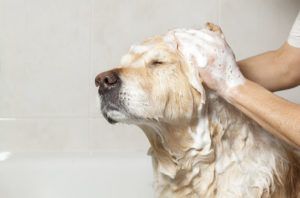As pet owners, we all want our beloved companions to have a pleasant and fresh smell. We ensure that they receive regular baths, use specialized shampoos, and even spray them with fragrances. However, despite our diligent efforts, some pets may still emit an unpleasant odor that persists despite our best attempts to eliminate it. This can be both frustrating and embarrassing, especially when guests are around. So why does your pet continue to have an unpleasant smell even though you regularly bathe them? In this article, we will explore the possible reasons for this problem and provide solutions to help you maintain a pleasant scent for your pet.

1. Skin Conditions
Allergies and Infections
One of the most common reasons for an unpleasant odor in pets is skin conditions. Just like humans, pets can also suffer from allergies and infections that can cause their skin to become irritated and inflamed. These conditions can be caused by various factors such as food, environmental allergens, and parasites. When the skin is inflamed, it produces excess oil and bacteria, which can lead to a foul smell. If your pet has been scratching excessively or has red, itchy skin, it is best to consult a veterinarian to determine the underlying cause and provide appropriate treatment.
Yeast Overgrowth
Another common skin condition that can cause an unpleasant odor in pets is yeast overgrowth. Yeast is a type of fungus that naturally resides on the skin of both humans and animals. However, when there is an imbalance in the skin’s pH level, yeast can multiply rapidly, leading to an infection. Yeast infections are more common in pets with folds in their skin, such as Bulldogs and Pugs. The infection can cause a musty, yeasty smell, and if left untreated, it can spread to other areas of the body. A vet can diagnose a yeast infection through a skin scraping and prescribe antifungal medication to treat it.
Seborrhea
Seborrhea is a skin condition that causes the overproduction of sebum, an oily substance that helps keep the skin moisturized. When there is an excess of sebum, it can mix with bacteria and cause a foul odor. Pets with seborrhea often have greasy, flaky skin and a distinct smell. This condition can be caused by genetics, hormonal imbalances, or underlying health issues. Treatment for seborrhea may include medicated shampoos, supplements, and medications to address any underlying conditions.
2. Dental Issues

Plaque and Tartar Buildup
Just like humans, pets need regular dental care to maintain good oral hygiene. If left untreated, plaque and tartar can build up on your pet’s teeth, leading to bad breath and an unpleasant odor. The bacteria in plaque can also cause gum disease, which can be painful and lead to tooth loss. To prevent this, it is essential to brush your pet’s teeth regularly and schedule professional cleanings with your veterinarian.
Tooth Decay and Infections
If your pet has a broken or decaying tooth, it can also contribute to an unpleasant odor. Bacteria can enter the tooth and cause an infection, which can produce a foul smell. In severe cases, the infection can spread to other parts of the body, causing serious health issues. Regular dental check-ups can help identify any dental problems early on and prevent them from worsening.
Diet
The food your pet eats can also affect their breath and overall body odor. A poor diet can lead to digestive issues, which can cause bad breath and flatulence. Some foods, such as onions and garlic, can also cause a strong odor in your pet’s urine and feces. It is essential to feed your pet a balanced and nutritious diet to keep them healthy and smelling fresh.
3. Anal Gland Issues
Impacted or Infected Anal Glands
Dogs and cats have anal glands that produce a foul-smelling fluid, which is used to mark their territory. These glands can become impacted or infected, causing discomfort and an unpleasant odor. If your pet is scooting on the floor or excessively licking their rear end, it could be a sign of anal gland issues. A veterinarian can express the glands manually or prescribe medication to treat any infections.
Poor Hygiene
Some pets may have an unpleasant odor due to poor hygiene. Long-haired breeds, in particular, may need regular grooming to prevent matting and buildup of dirt and debris. If your pet spends a lot of time outdoors, they may also pick up unpleasant smells from their surroundings. Regular baths and brushing can help keep your pet clean and smelling fresh.
Urinary Tract Infections
Urinary tract infections (UTIs) are common in pets, especially in female dogs. UTIs can cause a strong, ammonia-like smell in your pet’s urine, making it difficult to eliminate the odor completely. If your pet is exhibiting signs of a UTI, such as frequent urination, straining, or blood in the urine, it is crucial to seek veterinary care for proper diagnosis and treatment.
4. Ear Infections

Yeast or Bacterial Infections
Ear infections are another common cause of an unpleasant odor in pets. Yeast and bacteria can thrive in the warm, moist environment of the ear canal, leading to an infection. This can cause a musty, yeasty smell, and if left untreated, it can lead to hearing loss and other complications. Regular ear cleaning and proper drying after swimming or bathing can help prevent ear infections.
Foreign Objects
Sometimes, foreign objects such as grass seeds or foxtails can get lodged in your pet’s ear, causing irritation and infection. These objects can also produce a foul odor, and if not removed promptly, they can cause serious damage to the ear canal. If you notice your pet shaking their head or scratching at their ears, it is best to have a veterinarian examine them.
Allergies
Allergies can also affect your pet’s ears, leading to inflammation and infection. Environmental allergens such as pollen, dust, and mold can cause an allergic reaction in some pets, resulting in red, itchy ears and an unpleasant odor. Your veterinarian can perform allergy testing to determine the cause and provide appropriate treatment.
Conclusion
An unpleasant odor in pets can be caused by various factors, including skin conditions, dental issues, anal gland problems, ear infections, and poor hygiene. It is essential to identify the underlying cause and address it accordingly to keep your pet smelling fresh and clean. Regular veterinary check-ups, proper grooming, and a balanced diet can help prevent many of these issues. If your pet has an ongoing odor problem, it is best to seek veterinary care for proper diagnosis and treatment. With proper care and attention, you can keep your furry friend smelling fresh and cuddle-worthy at all times.
